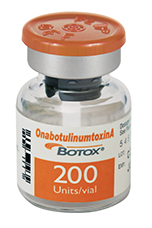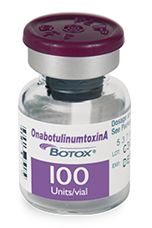
BOTOX® is a prescription medicine approved to treat overactive bladder symptoms such as a strong need to urinate with leakage or wetting accidents, urgency, and frequency in adults when another type of medication (anticholinergic) does not work well enough or cannot be taken.
BOTOX® may cause serious side effects that can be life threatening. Get medical help right away if you have any of these problems any time (hours to weeks) after injection of BOTOX®:
• Problems swallowing, speaking, or breathing, due to weakening of associated muscles, can be severe and result in loss of life. You are at the highest risk if these problems are pre-existing before injection. Swallowing problems may last for several months
• Spread of toxin effects. The effect of botulinum toxin may affect areas away from the injection site and cause serious symptoms including: loss of strength and all-over muscle weakness, double vision, blurred vision and drooping eyelids, hoarseness or change or loss of voice, trouble saying words clearly, loss of bladder control, trouble breathing, trouble swallowing
BOTOX® may cause loss of strength or general muscle weakness, vision problems, or dizziness within hours to weeks of taking BOTOX®. If this happens, do not drive a car, operate machinery, or do other dangerous activities.


Are allergic to any of the ingredients in BOTOX® (see Medication Guide for ingredients); had an allergic reaction to any other botulinum toxin product such as Myobloc® (rimabotulinumtoxinB), Dysport® (abobotulinumtoxinA), or Xeomin® (incobotulinumtoxinA); have an infection at the planned injection site.
Have a urinary tract infection (UTI) or cannot empty your bladder on your own (and are not routinely catheterizing). Due to the risk of urinary retention (difficulty fully emptying the bladder), only patients who are willing and able to initiate self-catheterization post-treatment, if required, should be considered for treatment. Patients with diabetes mellitus treated with BOTOX® were more likely to develop urinary retention than non-diabetics.
They include itching, rash, red itchy welts, wheezing, asthma symptoms, or dizziness or feeling faint. Get medical help right away if you experience symptoms; further injection of BOTOX® should be discontinued.
Tell your doctor about all your muscle or nerve conditions such as ALS or Lou Gehrig’s disease, myasthenia gravis, or Lambert-Eaton syndrome, as you may be at increased risk of serious side effects including difficulty swallowing and difficulty breathing from typical doses of BOTOX®.
Tell your doctor about all your medical conditions, including if you: have or have had bleeding problems; have plans to have surgery; have symptoms of a urinary tract infection (UTI) and are being treated for urinary incontinence. Symptoms of a urinary tract infection may include pain or burning with urination, frequent urination, or fever; have problems emptying your bladder on your own and are being treated for urinary incontinence; are pregnant or plan to become pregnant (it is not known if BOTOX® can harm your unborn baby); are breastfeeding or plan to (it is not known if BOTOX® passes into breast milk).
Tell your doctor about all the medicines you take, including prescription and nonprescription medicines, vitamins, and herbal products. Using BOTOX® with certain other medicines may cause serious side effects. Do not start any new medicines until you have told your doctor that you have received BOTOX® in the past.
Tell your doctor if you have received any other botulinum toxin product in the last 4 months; have received injections of botulinum toxin such as Myobloc®, Dysport®, or Xeomin® in the past (tell your doctor exactly which product you received); have recently received an antibiotic by injection; take muscle relaxants; take an allergy or cold medicine; take a sleep medicine; take aspirin-like products or blood thinners.
Other side effects of BOTOX® include: dry mouth, discomfort or pain at the injection site, tiredness, headache, neck pain, and eye problems: double vision, blurred vision, decreased eyesight, drooping eyelids, swelling of your eyelids, and dry eyes. In people being treated for urinary incontinence, other side effects include: urinary tract infection, painful urination, and/or inability to empty your bladder on your own. If you have difficulty fully emptying your bladder after receiving BOTOX®, you may need to use a disposable self-catheter to empty your bladder up to a few times each day until your bladder is able to start emptying again.
The Urology Center of Southern California is a single-specialty urology group which was founded in 1985.
Copyright © 2024 All Right Reserved By UCOSC.